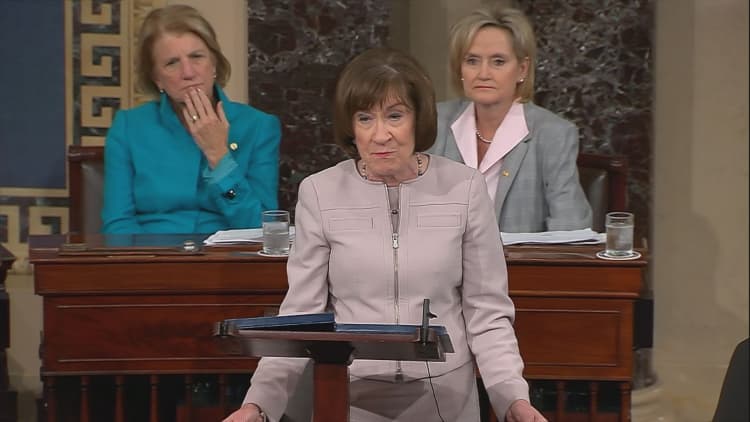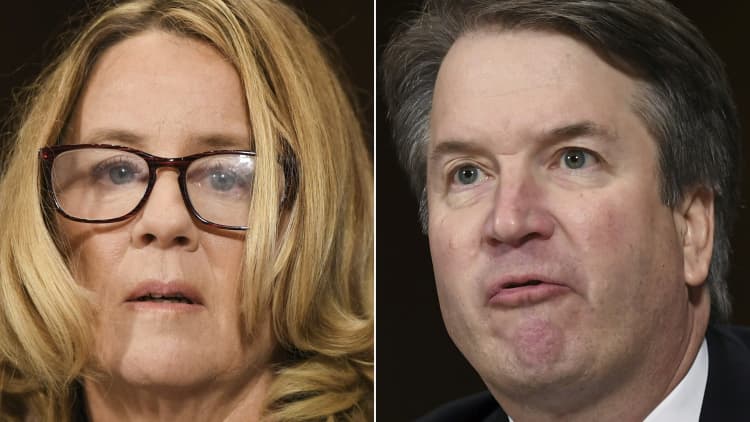Two key senators, one Democrat and one Republican, voted against their parties on Friday in a dramatic showdown on the floor of the Senate over the question of whether to advance Supreme Court nominee Brett Kavanaugh to a confirmation vote this weekend.
Sen. Joe Manchin, D-W. Va., voted yes. Sen. Lisa Murkowski, R-Alaska, voted no. After Sen. Susan Collins, R-Maine, said Friday that she would vote for Kavanaugh's final confirmation, Machin also announced his support for the appeals judge. The votes effectively secured his confirmation, barring any unexpected changes.
Murkowski has not yet stated her position.
The two senators stayed mum until the last minute about how they planned to vote. Friday's procedural vote was the first to force lawmakers to go on record with their support or opposition to the president's nominee.

On Thursday, after reviewing Kavanaugh's FBI background file, Manchin said he was "halfway" to reaching a decision. Murkowski, for her part, changed her mind on the way into the Senate chamber Friday, she told reporters.
Another possible swing vote, Sen. Jeff Flake, R-Ariz., voted yes on advancing Kavanaugh's confirmation and said he would likely vote to put the judge on the Supreme Court. Flake already said he would vote yes on Kavanaugh a week ago, but he moved to delay the process in order to let the FBI probe sexual misconduct allegations against the federal appeals court judge.
The procedural vote was 51-49 as the gavel came down Friday, assuring Kavanaugh a final vote, perhaps as early as Saturday, on his lifetime appointment to the highest court in the land.
Manchin's 'yes'
Manchin is one of three Democrats who voted to confirm Justice Neil Gorsuch to the high court last year. The other two, Joe Donnelly of Indiana and Heidi Heitkamp of North Dakota, both voted against Kavanaugh on Friday.
Manchin is running for re-election in November in a deep-red state that President Donald Trump carried with nearly 70 percent of the vote in 2016.
His Republican opponent, West Virginia Attorney General Patrick Morrisey, is running on his closeness to the president. Morrisey has slammed Manchin as a Washington insider in cahoots with Senate Minority Leader Chuck Schumer, D-N.Y.

"Joe Manchin is waiting until the outcome is decided before he reveals his vote," Morrisey told Politico in an interview published Thursday, accusing him of "giving Chuck Schumer and the radical liberals more time to obstruct and go after Kavanaugh."
Manchin has said that his vote on Kavanaugh would not be affected by political calculations.
Those attacks don't seem to be doing much damage, however, with Manchin continuing to lead Morrisey by more than 9 percentage points with the midterms just over a month away, according to the Real Clear Politics polling average.
Murkowski's 'no'
Murkowski seemed pained as she revealed her vote on Friday, whispering "no" and looking straight ahead.
"I believe Brett Kavanaugh is a good man," she told reporters Friday. But, she added that she thinks he is "not the right man for the court at this time."
On Thursday, Alaska's senior senator spent hours in private meetings with Alaskan women who opposed Kavanaugh's confirmation, including a number of sexual assault survivors, NBC News reported.
Murkowski also faced pressure from Alaska Natives, a significant voting bloc that makes up more than 15 percent of the state's population.
Native groups worried about Kavanaugh's judicial stance on indigenous rights, as well as the possibility that a conservative court could damage President Barack Obama's signature health-care legislation. Activists also worried about Kavanaugh's previous rulings siding with business interests over environmental groups.
"Alaska Natives have a long and proud history of defending this land and its resources. We have no intention of staying silent now," Richard Peterson, president of the Central Council of the Tlingit and Haida Indian Tribes of Alaska, wrote in a letter addressed to Murkowski, Reuters reported.
Murkowski was one of two Republican women who Democrats targeted as a potential swing vote.
Murkowski and Collins are both moderates who have split with their party on issues including abortion, which has been central to the Supreme Court fight.
Collins, who left onlookers guessing until Friday, ultimately voted to advance Kavanaugh's nomination. She announced her final decision in a detailed floor speech in the afternoon.


